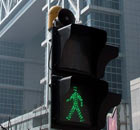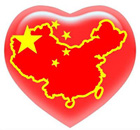Economy
China's GDP grows 11.9% in Q1, CPI up 2.2%
(Xinhua)
Updated: 2010-04-15 11:41
 |
Large Medium Small |
BEIJING - China's gross domestic product (GDP) grew 11.9 percent year on year in the first quarter to 8.06 trillion yuan ($1.19 trillion), the National Bureau of Statistics (NBS) announced Thursday.
The increase is 5.7 percentage points higher than the same period last year when the economic growth slowed to 6.2 percent, the lowest in a decade.
| ||||
"With the implementation of the stimulus package to combat the global financial crisis, the Chinese economy achieved a good start this year as the recovery momentum continues to consolidate, laying a solid foundation to meet the annual economic target," NBS spokesman Li Xiaochao said.
"The 11.9 percent growth in the first quarter is largely a result of last year's low comparison base, and the government's stimulus," Li said.
He noted the economic conditions remained "very complicated" with many difficulties still existing.
"The world economy is gradually reheating in an unbalanced manner and faces uncertainty, as commodity prices rose sharply and many countries reported sovereign debt crises," he said.
The severe drought in southwest China and the rapid price increase of industrial products were challenges to achieving 8 percent annual growth, he said.
"Although the task is daunting and the difficulties are still there, 8 percent growth could be realized this year," he said.
In response to questions about the continuation of the stimulus package, Li said the government would keep the economic policy stable and consistent as problems and difficulties remain.
"We will also make policy-setting more flexible and targeted according to developments, such as the increasing cost pressures for many businesses," he said.
The proactive fiscal policy and moderately easy monetary policy would continue, he said.
China's consumer price index (CPI), a main gauge of inflation, rose 2.4 percent year on year in March, the NBS announced.
The producer price index (PPI), a major measure of inflation at the wholesale level, rose 5.9 percent in March from a year earlier.
China's PPI went up 5.2 percent year on year in the first quarter, said NBS.
In the first quarter, consumer prices in urban areas increased 2.1 percent while rural regions' consumer prices rose by 2.4 percent. Food prices, which accounted for about a third of the CPI, gained 5.1 percent.
"China's consumer prices are currently stable," Li said.
He attributed the rise in CPI to the "tail-raising factor," or the relatively low comparison basis of the first quarter of 2009.
The tail-raising factor, which refers to the influence of price changes last year on the year-on-year figures this year, lifted first quarter CPI growth by one percentage point, he said.
Bad weather was another important factor, Li said, as the freezing winter brought dramatic rises in food prices, which accounted for 1.64 percentage points, or 70 percent of first quarter inflation.
Li also noted that other factors - rising international commodity prices, domestic producer prices and industrial costs - have also started to push up the CPI.
China is targeting a rise in consumer prices of around 3 percent this year, according to a government work report delivered by Premier Wen Jiabao last month at the annual parliamentary session.
It will be "difficult and challenging" to achieve the inflation goal, but the 3-percent target is still within reach with "concerted efforts and solid work," Li said.
China's CPI ended nine months of decline in November last year, when it rose 0.6 percent, as the nation's economy rebounded strongly.











